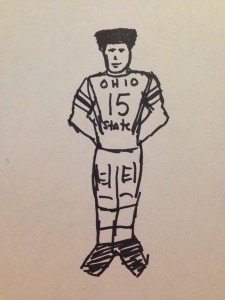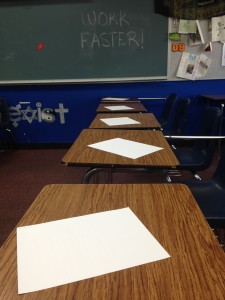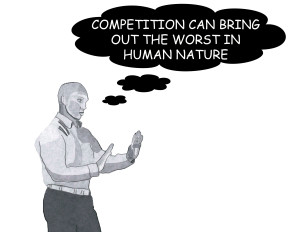
I’ll bet you’ve heard this article of faith.
Clichés, like the one above, often assume the power of holy scripture. No one questions their veracity. This is odd!
My entire life, I’ve heard this cliché about competition blathered enthusiastically. To a large degree, I embrace it. Competition in the classroom can infuse a serious adrenaline rush. I use games and simulations frequently. But there are trade-offs. People can get carried away when competition is involved. Have you ever witnessed adult behavior at youth sporting events?
My 9th grade Global Studies class recently competed in two contests designed to apply concepts from the Industrial Revolution. Students didn’t anticipate, however, that the simulations would spawn an intense discourse on human nature and challenge the simplistic cliché about competition.
Artisan were dominant prior to the Industrial Revolution. On the 1st day of the simulation, students became artisans. They were tasked to draw a person…head to toe. It was fun, relaxing, and hilarious. The students chatted, listened to music, and doodled away. It was totally chill!
Some kids are terrible drawers! No one cared. Some of the awful drawings were celebrated when students shared their masterpieces. We voted which we liked best. Those talented artists were rewarded with a Reese Cup. Good times were had by all.

When you live in Columbus, Ohio, kids draw Buckeye football players.
On day two, students mass-produced the superior drawings. My kids went from respected happy artisans to undervalued and stressed unskilled assembly line workers. Even the celebrated artists from the previous day were inserted unceremoniously on to the line.
I divided the class into competing teams. Each student was assigned a body part to reproduce. Sheets of paper moved along the assembly line (a row of desks) and images far inferior to the originals emerged. In the spirit of unbridled Capitalism, I promised that the team that produced the most quality pictures would be rewarded with restroom passes. I warned students that I didn’t have enough passes for everyone on each team. I bellowed, “Slackers will not be rewarded!” This created instant intra-team animosity.
The atmosphere of the class morphed into a hyper chaotic place. Students were certainly motivated, but they were hardly enjoying themselves…nor were they friendly to one another. It didn’t help that their psychotic teacher kept exhorting them and warning them about talking or sandbagging.
After ten minutes, I mercifully ended the production day. The knives came out immediately! Students on the successful team quickly ratted out slackers and made it clear they should receive no reward. It was epic!

Assembly line stations or the “Gates of Hell”…take your pick.
Many issues were addressed during the fascinating debriefing:
- How did the simulation compare to the Industrial Revolution?
- What was the difference between being an artisan and an unskilled laborer?
- What were pros and cons to the different methods of production?
But…I struck gold with this prompt:
- What did this simulation teach you about human nature?
The ensuing discussion was passionate and interesting! It became their next writing prompt. Most concluded that the cliché about competition was far too simplistic.

Perhaps, a better cliché would be, “Competition motivates us!” Granted…it’s not nearly as catchy.
My book “You’ve Gotta Connect” is all about how teachers can forge strong relationships with students. You can also listen to me dialogue about bonding with young people on numerous podcasts.
Please follow me on Twitter @jamessturtevant
I also love doing professional development. If you’re interested, here’s my email: pjsturtevant@gmail.com



